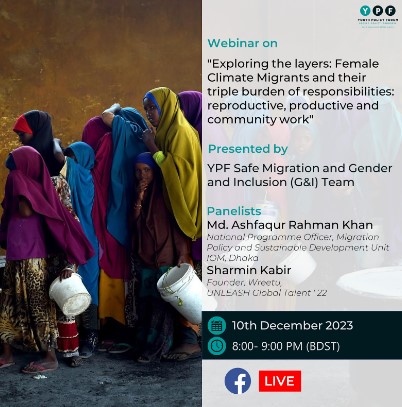Written by: Sabikun Nahar
Associate, Safe Migration Team
On December 10th, World Human Rights Day, Youth policy Forum-YPF G&I and Safe migration team concluded the 16 days of activism against gender based-violence with a webinar. The webinar was on “Exploring the layers; Female Climate Migrants and their triple burden of responsibilities: reproductive, productive and community work”. The two esteemed panelists of this webinar were MD. Ashfaqur Rahman khan, National program officer, migration policy and Sustainable Development Unit, IOM, Dhaka and Sharmin Kabir, founder Wreetu, UNLEASH Global talent ‘22.
In that webinar, the Safe Migration Team initially presented some statistics and explained the triple burden of responsibility faced by women. Following that, the Gender and Inclusion (G&I) Team discussed the gaps in policy and conceptual frameworks through a presentation. The discussion then shifted to a broader forum through a Q&A session.
YPF: How does the triple burden of responsibility influence the migration decision of women in the context of climate change?
Md Ashfaqur Rahman: Majority of our poverty-stricken population is migrating from rural to urban areas due to improve their quality of lives. The female class in our population is migrating abroad mainly due to financial reasons rather than climatic reasons. When a female member wants to migrate, it’s not an individual decision but a family decision. The triple burden of responsibility makes it more tough for a female migrant. Besides, in every sector of our country, gender discrimination exists and women have to face a lot of responsibilities. Similarly, in case of migration, gender dimensions exist too and one of the greatest threats for female migrants is safety issues. Right now, our policies and research are quite rich but executing these policies are a matter of question now.
YPF: Are there any major policies that address the unique challenges faced by the female migrants?
Md Ashfaqur Rahman: Majority of the policies protecting migrants are directed towards external migration but the rural to urban migration lacks enough policies addressing that. Govt sectors, NGOs and other charity organizations are working together to develop these policies. Currently there are some strong ongoing government activities that specifically address the female climate migrants’ issue.
YPF: When we want to work on the health issues in the migrant community, how can we ensure a supportive and accessible environment so that female migrants can confidently use their menstrual hygiene products in their community?
Sharmin Kabir: Menstrual health issues are still taboo in our country. As our policy making is mostly driven by male gender the menstrual hygiene issues are not prioritized. Even when we make a list of relief equipment for the migrants the women’s hygiene materials are not on the priority list. The shelter camps’ situation is not favorable for women and the toilet facilities are very poor. Men are not seen to be empathetic towards women. We tried to renovate the toilets and teach men and boys empathy towards their female counterparts.
YPF: What are the effective and equitable policies that the government can take to make a menstrual health framework and national strategy?
Sharmin Kabir: Paperwork of this issue is very strong but weak in implementation. The Government has already conducted some studies addressing this issue. Government has included hygiene programs in the school activities. But monitoring of those programs are also vital. Some teachers might not even want to talk about it. Before implementing any policy, the government should recheck if the parents and teachers are ready to accept it. We cannot wait until the Government takes any action. We need to start working from an individual level to raise awareness.
YPF: How does the triple burden of responsibilities affect the economic empowerment of female migrants?
Md Ashfaqur Rahman: Generally, in our country’s context, Women can’t fully concentrate on their job because of other existing burdens. But these issues are not raised until we fulfill our basic needs. Basic needs are first to be fulfilled. Otherwise we can’t think about issues like menstrual hygiene management for women. Nowadays, incremental changes are coming and now we can talk about and think about many sensitive issues. Economically empowering women will be a transformative change and it will come if we start teaching our young generation.
YPF- Do you think female migrants are in a vulnerable state because of this triple burden of responsibilities? How can we work together with male to prevent gender-based violence?
Md Ashfaqur Rahman: Gender based violence is present all over the world. Even in developed countries there is gender-based discrimination but It’s on a lower level due to them having a strong reporting system and implementation system people of developed countries are more aware of. Female climate migrants face the worst situation as they can’t even express themselves because of the language barriers. Many govt and non govt organizations are working on these and it can be successful if we implement it properly.
YPF- How can we engage men as allies to combat gender-based violence?
Md Ashfaqur Rahman: We can’t create uniform policies for all men- we need to categorize according to their age, education, and income status. To build men as an ally we need to focus on building our newer generation specially building our kid’s mentality towards a more gender inclusive one.
YPF- How can we establish a support system that addresses the complexity of additional responsibilities faced by female climate migrants due to mental health challenges?
Sharmin Kabir: The triple burden of responsibility is a natural process too. Let’s look at the responsibilities of women as a way of life-not a triple burden. When we are ready to accept a challenge, the solutions are easier to find. The family member should be supportive and create space for women to enjoy life for themselves, not catering to the mentality that they should do everything. Mental health issues should be regarded with the same importance as physical health problems by everyone.
